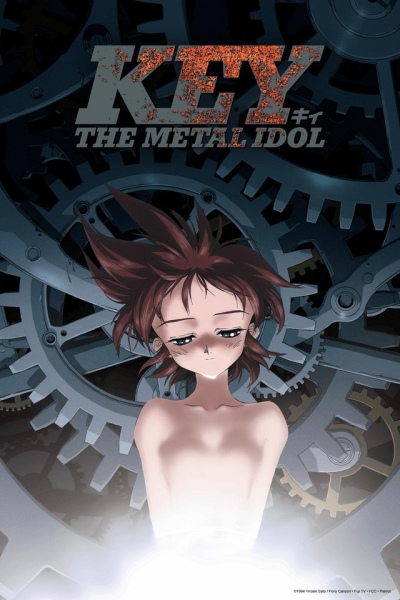Reviews for Key the Metal Idol (6.99)
egg_of_lilith
Ishikura Keiichi
Satou Hiroaki

With its subtle melancholy and surreal, obscured but intriguing plot, Key the Metal seems made for nostalgia. For me, it`s forever linked to the early 2000s, when I would pop the D...
Home
 Twitter
- Unrated
Twitter
- Unrated
16.12.2022 20:52 - direct link
(rs11063)

With its subtle melancholy and surreal, obscured but intriguing plot, Key the Metal seems made for nostalgia. For me, it's forever linked to the early 2000s, when I would pop the DVDs into my Playstation 2 tray, wait through that ethereal boot-up chime, and binge from my bedroom floor.
I must have been led to the show from recommendations likening it to Serial Experiments Lain and Evangelion. Back then, with fewer anime translated and accessible to U.S. markets, fans were much quicker to point out Key's influence on the sci-fi anime that came after. These days, it seems largely forgotten, which is a real shame.
It follows the titular character, a robot girl whose grandfather tells her on his deathbed that, in order to become human, she must make 30,000 friends before her battery runs out. Parallel to this story, the nefarious Ajo Heavy Industries is rapidly and unethically developing their weaponized android technology, while doing something shady with idol singer Miho.
Everyone wants something different for Key and the show demonstrates how a modern world isn't in agreement on the best way to make 30,000 friends. Her childhood friend Sakura, who works multiple jobs to survive in Tokyo, sees her own unhappiness exposed in adopting Key as a roommate. She offers the only advice she can, which is to throw herself into the working world and define her value by her productivity. They meet the president of Miho's fan club, Tataki, at which point Key decides the best way to make 30,000 friends is to become a similar pop idol. A cult leader interferes after he meets Key and becomes immediately invested in her spiritual development. The meat of the show's onscreen conflict comes from the differing agendas between these four characters, which leads to the exploration of a lot of different ideas that push characters to stake their position across a moral and philosophical spectrum.
Key continuously surprised me in the ways it examines concepts and turns them inside out by overlapping artificial intelligence, the pop idol phenomenon, religion, and industry. It does more than ask what it means to be human, but explores the ways people dehumanize each other and even raise each other to god-like statuses, the institutions and industries that decide what our reality is, and the line between science and magic. One character musing on the nature of Miho, says,
The script is filled with gems like this and this:
It's not without its issues. It's uneven, especially across its last two 90-minute episodes. The first of these is an exhausting plot dump and the last rockets the story forward in a way that feels disconnected after so much backstory on what feel like brand new characters, after the fact. I loved the direction Key takes, but it was still a jarring shift that I wish had come earlier and with more subtlety.
In some ways, Key is cyberpunk in reverse: rather than exploring the subjugations and dynamics that arise from bodies and societies run by technology, it paints a picture of technology trying to power itself with the human spirit.
